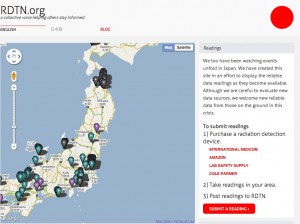Crowdsourcing Japan’s Nuclear Crisis
 In the aftermath of Japan’s recent earthquake, the Japanese have turned to crowdsourcing in their battle against the nuclear crisis. RDTN.org recently launched online, allowing people to submit their own radiation readings that are then posted in comparison to data contributed by official sources. According to the website’s developers:
In the aftermath of Japan’s recent earthquake, the Japanese have turned to crowdsourcing in their battle against the nuclear crisis. RDTN.org recently launched online, allowing people to submit their own radiation readings that are then posted in comparison to data contributed by official sources. According to the website’s developers:
We have created this site in an effort to display the reliable data readings as they become available. While we are careful to evaluate new data sources, we welcome new reliable data from those on the ground in this crisis.
Although primarily built to gather data from citizens taking readings on the ground, the site also takes readings from official sources including Pachube.com, an infrastructure platform that gathers community-based environmental data, and Japan’s Ministry of Education, Culture, Sports, Science and Technology. The developers also stress that RDTN is not meant to replace data taken by official agencies monitoring the nuclear activity in Japan.
Perhaps to encourage submissions, the site also provides a list of EMF radiation detectors. Marcelino Alvarez, the founder of Uncorked Studios and the developer behind RDTN, mentioned that the run on detectors has dwindled supplies. Furthermore, he acknowledges that the crowdsourcing concept has its limits, especially in the site’s beginning stages. In an interview with NPR, he said:
If we could get these devices cheaper and more dependable, it could be a network for radiation detection. We’re nowhere near that level of sophistication. It most certainly is a work in progress and it’s still too early to assess it.
Despite this, the site has already received over 1,000 likes on Facebook.
Similar crowdsourcing tools have cropped up online to help people stay up-to-date on the nuclear situation in Japan. CNET recently reported that altTokyo.com has published a live geiger counter that refreshes every 60 seconds, and Boing Boing highlighted the Google Map that marks all the known, unofficial monitoring sites in the country.